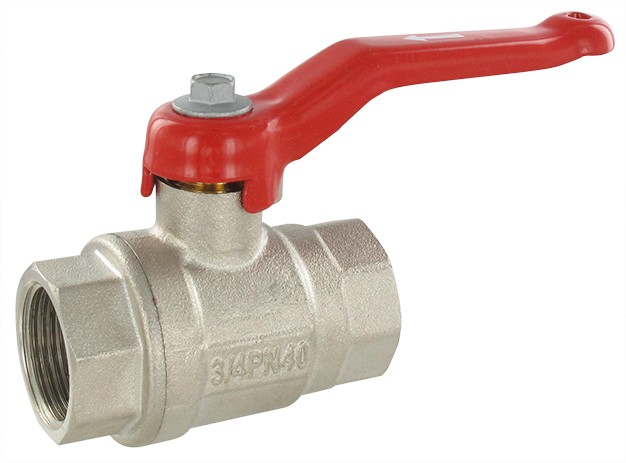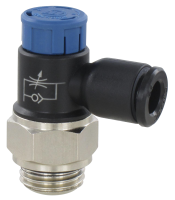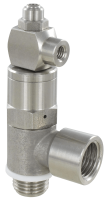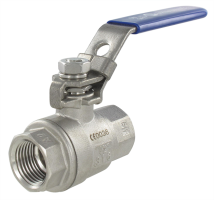
Valves are mechanical devices that control, and more specifically open, close or regulate the flow of a liquid or gaseous medium in a pipeline. There are many different types of valves including: ball valves, needle valves, diaphragm valves, rotary lever valves, angle seat valves, flap valves and many others...
Valves are used for specific purposes: shut-off valves, control valves, bleed valves, etc. They can be found in almost all sectors of activity: industrial, plumbing, food, pharmaceutical, transport, medical, construction, automotive, but also in private households.
The shape of the valve body can be straight (inlet opposite the outlet), angled (inlet perpendicular to the outlet), bypass (one inlet, several outlets), mixer (two inlets, one outlet)...
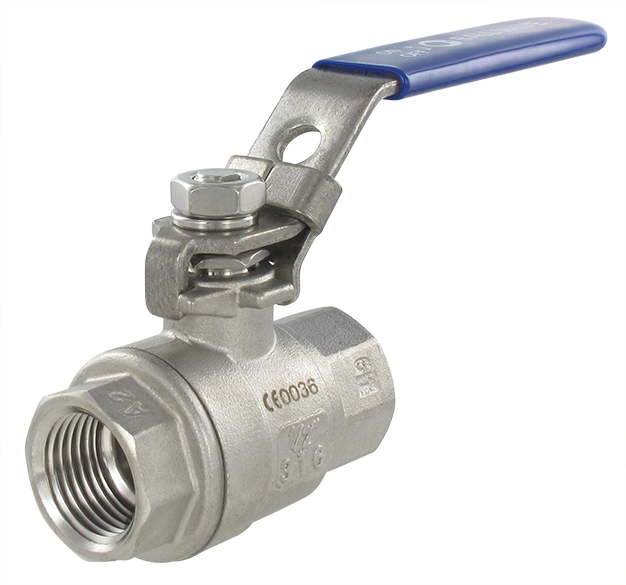
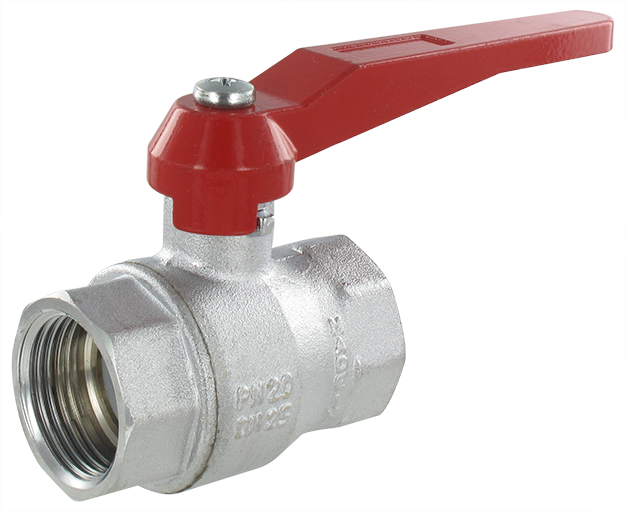
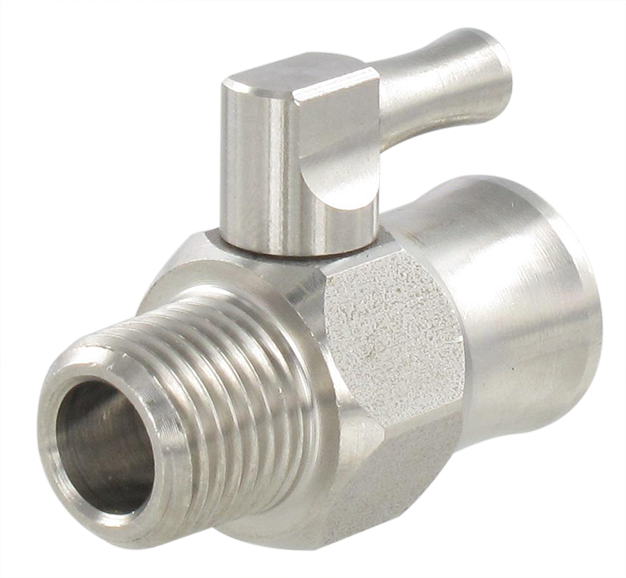
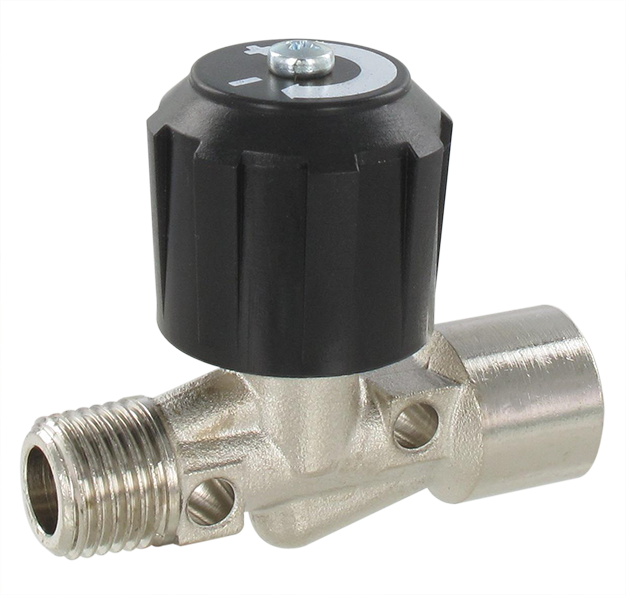
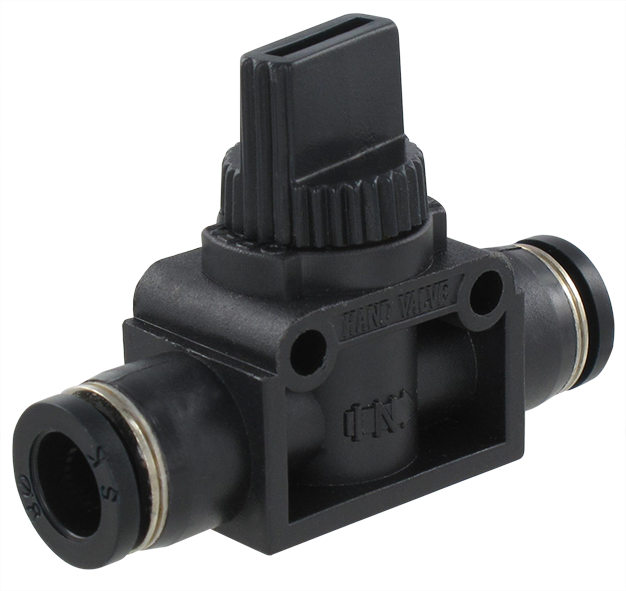
The main characteristics of a valve :
- The type: ball, ball with padlockable lever, needle, diaphragm, rotary lever, angle seat, poppet...
- Thread (BSP, NPT) and nominal diameter (DN)
- Compatible fluid(s): compressed air, water, oil, aggressive fluids...
- Material: nickel-plated brass, chrome-plated brass, stainless steel, technopolymer, etc.
- Nominal (PN) and maximum pressure
- Standard: DIN, ISO, ANSI, etc.
- Valve actuation: lever shape
Ball valves
Ball valves are one of the most common types of valves utilized across various industries. These valves feature a drilled ball mechanism, offering several advantages. One of the key benefits is their excellent ergonomics, as the lever (which can be a handle or butterfly) is incredibly easy and quick to operate. With just a quarter turn, the fluid passage can be opened or closed efficiently. Additionally, ball valves are highly compact, making them suitable for installations where space is limited. Moreover, these valves ensure tight sealing, providing reliable performance and preventing leakage. Overall, ball valves are a popular choice due to their ease of use, compact design, and guaranteed tightness.
Materials and components
The compact ball valves are made of chrome-plated brass.
Field of application: compressed air, oil, water
- Maximum working pressure: -0,99 ÷ 20 BAR
- Working temperature: -20°C / +80°C
- Direction of fluid flow: both directions.
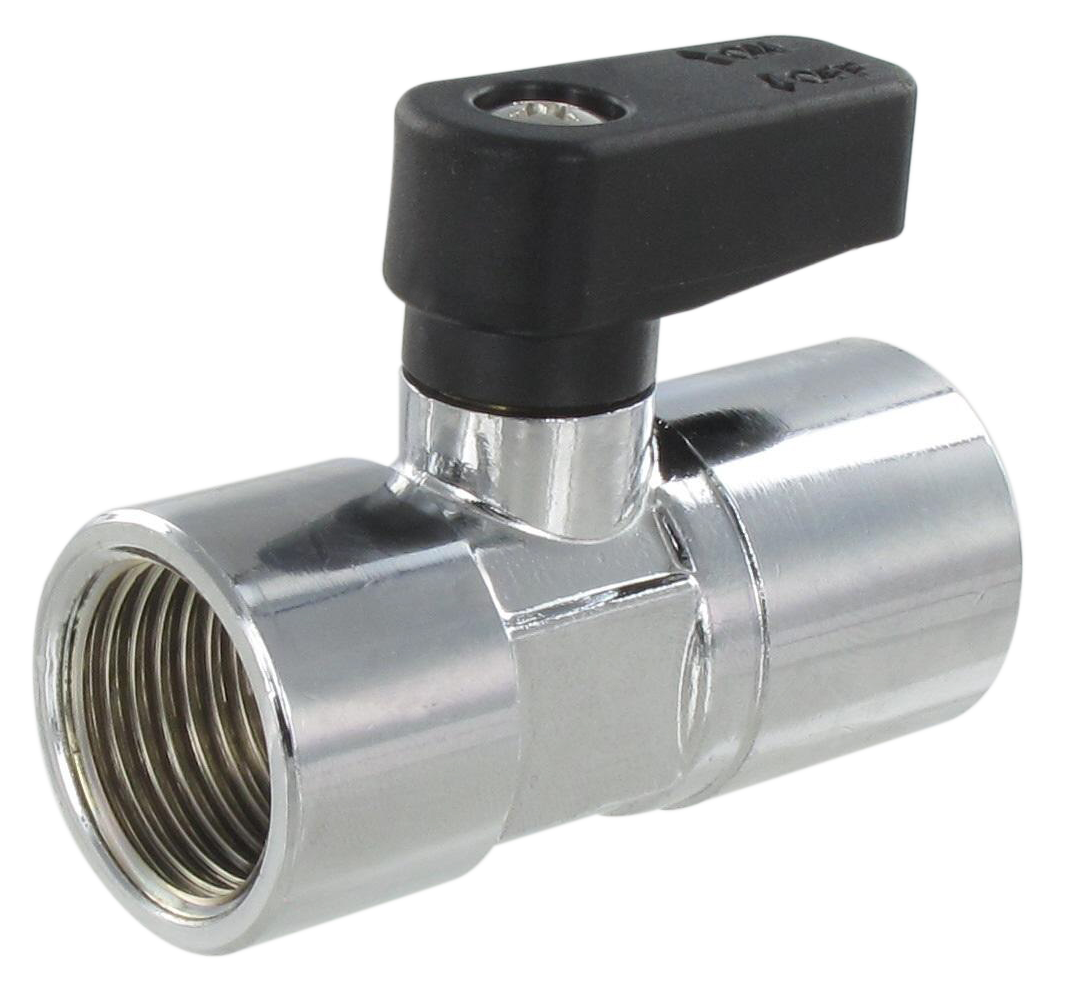
The "mini series" ball valves are machined either :
- in chrome-plated hexagonal bar
- in forged, sandblasted or chrome-plated brass
Field of application: compressed air, oil, water
- Maximum working pressure: 10 BAR at 90°C
- Working temperature: -10°C / +90°C
- Direction of fluid flow: both directions.
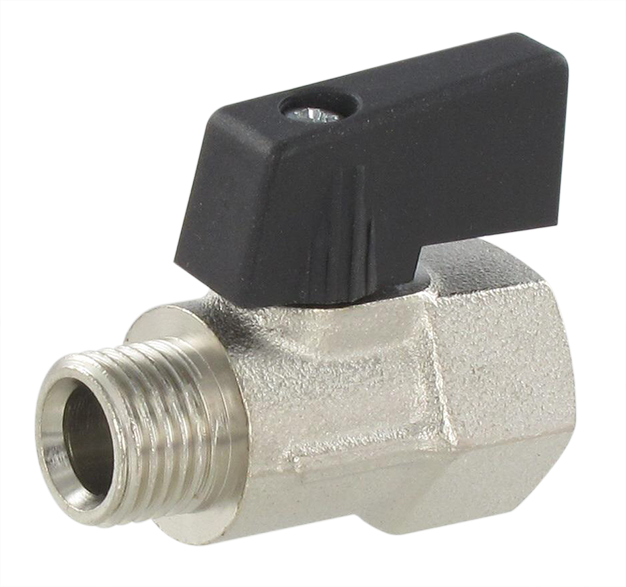
> High pressure mini series ball valves
Field of application: compressed air, oil, water
- Maximum working pressure: 30 BAR (0 - 70° C)
- Working temperature: -20° C / +90° C
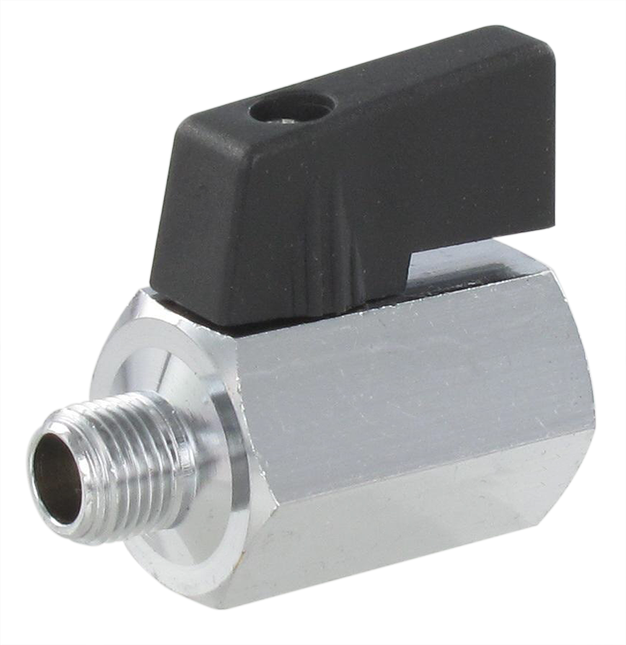
Materials and components
Standard series ball valves are made of nickel-plated brass.
Application range: compressed air, oil, water
- Maximum working pressure: 20 BAR at max. 80°C for PN 20 and 40 BAR at max. 80°C for PN 40
- Working temperature: -10°C / +120°C depending on medium and pressure
- The female threads are cylindrical BSP.
- Full bore.
> Lockable pressure relief valves
Materials and components
- body in nickel-plated brass - ball seal in PTFE - seals in FPM
- flat lever in plastic-coated steel - ball in chrome-plated brass - ball seat: PTFE
Field of application: compressed air
- maximum working pressure: 14 BAR (0°C ÷ 30°C)
- working temperature: -10°C / +100°C
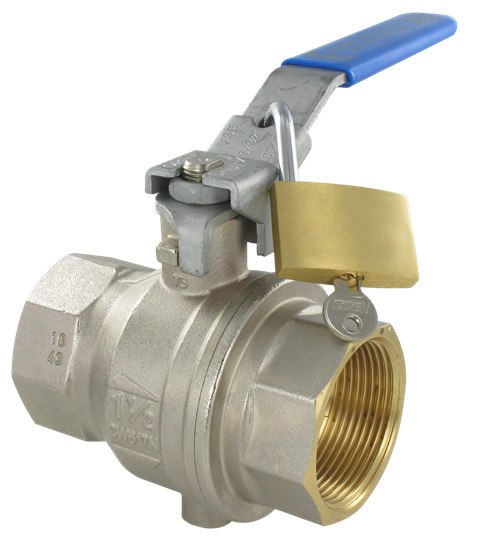
> Stainless steel valves standard series
Materials and components
- body in AISI 316 stainless steel - ball seal in reinforced PTFE
- 304 stainless steel lever - AISI 316 stainless steel ball
- PTFE seals - lockable handle
Field of application: aggressive environment
- maximum working pressure : variable according to fluid
compressed air : 7 BAR at 20°C
water: 64 BAR at 40°C (117 VX)
steam: 10 BAR maximum (117 VX)
- working temperature: -20°C / + 180°C

> Stainless steel valves mini series
Materials and components
- body in stainless steel AISI 316 L - ball in stainless steel AISI 316
- lever in AISI 316 L stainless steel - seals in FPM
Field of application: compressed air
- maximum working pressure: 10 BAR
- working temperature: -20°C / +150°C

> Stainless steel valves mini series aluminium lever
Materials and components
- body in AISI 316
- aluminium lever
- ball in AISI 316 stainless steel
- ball seal in PTFE
Field of application: compressed air
- maximum working pressure: 63 BAR
- working temperature: -25°C / +180°C
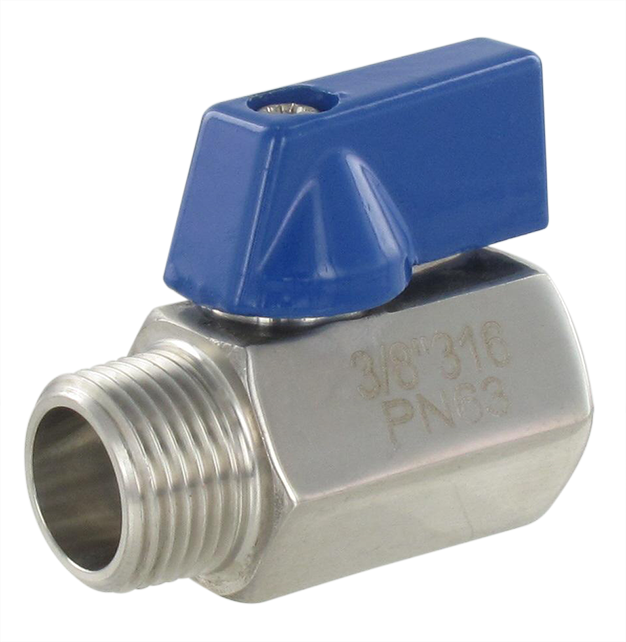
Materials and components
- technopolymer body
- technopolymer lever
- stainless steel clamp
- NBR oil resistant rubber seal
Field of application: compressed air
- maximum working pressure: 10 BAR
- working temperature: -0°C / +60°C

Needle valves
Needle valves are a type of manually operated valve highly valued for their compact size and economical pricing. These valves are commonly utilized for controlling fluids, both liquids and gases, especially in applications requiring low flow rates and pressures. Operating the valve involves turning a small knob, allowing for precise adjustment of the flow rate. With their simple yet effective design, needle valves are indispensable components in various industries and applications where accurate fluid control is paramount.
Materials and components
- nickel-plated brass body
- resin knob
- NBR oil resistant rubber seals
Field of application: compressed air, water
- maximum working pressure: 18 BAR
- working temperature: -10°C / + 80°C

Conclusion
In conclusion, valves play a crucial role in various industries by enabling efficient control of fluid flow, whether liquid or gas, in pipelines. Their diversity of types and configurations offers a tailored solution to every need, whether for industrial, domestic, or commercial applications.
Whether it's for shut-off, regulation, or purging valves, it's essential to choose the right type of valve based on the specific characteristics of the application, such as the type of fluid, working pressure, and temperature. Additionally, the quality of materials used in valve manufacturing is a key element to ensure their durability and reliability over time.
Ball valves are among the most commonly used due to their ease of use, compactness, and tight sealing. Needle valves, on the other hand, are preferred for their precise regulation capability of low-flow and low-pressure fluids.
Regardless of the type of valve chosen, it's essential to ensure compliance with applicable standards and directives to guarantee their proper functioning and safety. By choosing quality valves and regularly maintaining them, you can ensure optimal operation of your piping systems and contribute to the overall performance of your installations.


